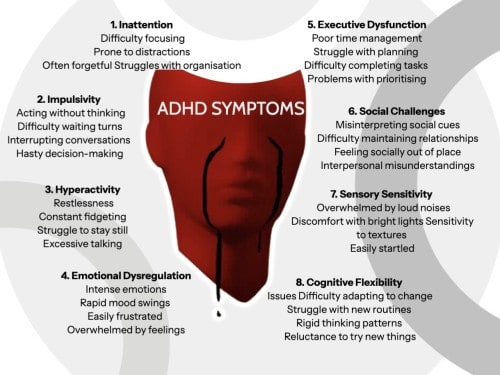Unmasking the Challenges of ADHD

posted 21st November 2023

Understanding ADHD in Adults: Unmasking the Hidden Challenges and Embracing Potential
Attention Deficit Hyperactivity Disorder (ADHD) is a condition often shrouded in misunderstanding and frequently goes undiagnosed, especially in adults. This neuro-developmental disorder significantly affects an individual's ability to control their behaviour in a way that aligns with societal expectations for their age, leading to challenges in many areas of life.
One of the lesser-known signs of ADHD is the 'masking' of the disorder with a vibrant, seemingly bubbly personality. This can conceal other traits commonly associated with ADHD, such as regularly zoning out, exuding external confidence while internally battling anxiety, fidgeting, and frequently feeling burnt out. Individuals with ADHD often grapple with low self-esteem, poor time management, and a short attention span, contributing to feelings of inadequacy and underachievement.
ADHD manifests through persistent patterns of inattention, impulsivity, hyperactivity, and struggles with emotional regulation. These behaviours are rooted in neurological differences and can lead to substantial functional disabilities throughout a person's life. While ADHD was once thought to primarily affect children, recent research indicates its continued prevalence in adulthood, impacting one in 20 individuals.
Despite its challenges, ADHD is also associated with positive traits. People with this condition are often empathetic, energetic, spontaneous, creative, intuitive, and imaginative. They demonstrate inventiveness, innovation, enthusiasm, and an ability to hyper-focus on areas of interest, alongside a sense of adventure. However, they may also experience difficulties like being easily distracted, forgetful, disorganised, overly talkative, having trouble sleeping, daydreaming, hyperactivity, and low frustration tolerance.
Dr. Amen, an American neurologist, highlights that signs of ADHD can extend beyond typical attention and hyperactivity issues. Chronic lateness, procrastination, and disorganised personal spaces are additional indicators of the disorder.
The growing awareness of these symptoms has led to an increase in diagnoses, particularly among women. Many have shared their experiences with ADHD, ranging from having a plethora of interests yet struggling to maintain hobbies, to recognising themselves in descriptions of ADHD for the first time.
Understanding and acknowledging these signs is crucial for accurate diagnosis and effective management of ADHD. With appropriate intervention and support, individuals with ADHD can harness their strengths, address their challenges, and lead fulfilling lives.
To illustrate, consider the story of Emma, a 32-year-old graphic designer, who was recently diagnosed with ADHD. Emma's experiences are a testament to the varied manifestations of ADHD. She excels in engaging tasks but struggles with administrative duties, often missing deadlines and forgetting emails. Her difficulty transitioning between tasks, sensitivity to sensory inputs, impulsive decision-making, and challenges with routine tasks are all indicative of her condition. Emma also faces interpersonal challenges, such as inadvertently interrupting others, and finds relaxation difficult. Her intense emotional responses further highlight the impact of ADHD on her daily life.
After her diagnosis, Emma's understanding of these behaviours as manifestations of ADHD, not personal failings, allowed her to seek effective treatment. This included therapy and strategies to manage her symptoms, leading to a significant improvement in her quality of life.
At the London Psychologist Clinic, we are committed to providing support and understanding for individuals with ADHD, helping them to navigate their unique challenges and embrace their full potential.



